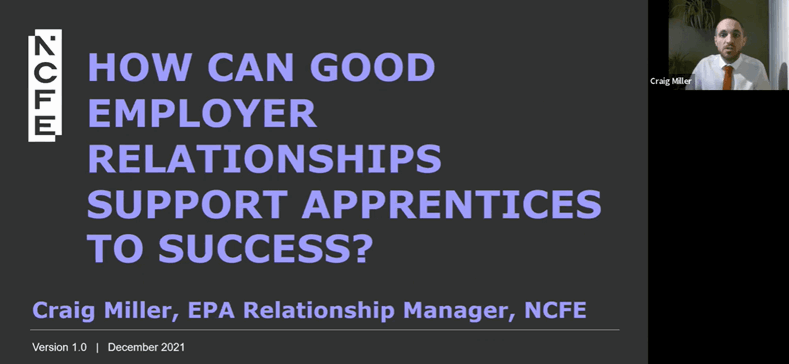Our EPA Relationship Manager, Craig Miller, recently spoke at the AoC Employer Engagement Conference 2021. With demands from colleges on employers being so high at present, the conference’s focus was on “getting the most from the relationship”, considering topics such as the breadth of employer engagement and how effective relationships with employers can be maintained.
Here, we outline 3 key takeaways from Craig’s breakout session: “How can good employer relationships support apprentices to success?”

Early engagement leads to trusting relationships
It’s important to provide the employer with as much information as possible at the beginning of the apprenticeship journey, so that expectations and how they’re going to be supporting the apprentice are made clear. Doing so is likely to ensure that they are more engaged throughout the journey, as well as being more aware of the requirements they’ll need to undertake throughout. Explains Craig:
“As an end-point assessment organisation (EPAO), we believe that starting with the end in mind allows the apprentice and representatives from that employer to fully understand what the overall goal is from the apprenticeship, as well as providing the opportunity to develop a support plan to help the apprentice achieve to the best of their ability.
“By having that open conversation at the start, you, the employer and the apprentice can discuss what you think the apprentice is going to achieve. That allows you to develop that plan with regards to their journey, helping them to succeed to the best of their ability.”
As well as building a trusting relationship between all three parties, this also allows for plenty of flexibility – for example, whilst you may work to get the apprentice to a pass in the first instance (they may be brand new to the sector or have limited experience), you may then work to support them to develop knowledge, skills and behaviours to far exceed this target.
Open and effective communication is key
The importance of strong relationships with employers cannot be understated, and a fundamental element of this is open and effective communication throughout your interactions with an employer. As Craig outlines:
“Effective communication and regular contact are key factors when it comes to building relations with employers. It’s important that communication is open, to allow effective sharing of opinions, feelings or expectations, so that the employers can approach you as the provider to ask questions and gain advice or clarity where needed – or even challenge a decision that they don’t necessarily agree with.
“This is also the same in reverse – having that open relationship and trust with the employer means you can also approach them about any situations or concerns that you have. For example, they may not be supporting the apprentice to achieve off-the-job training hours, or whether that is around the apprentice’s ability to meet knowledge, skills and behaviours within their job role.”
Being open to a variety of communication methods is also vital to achieving open communication. Be conscious that people like to communicate in different ways – whether that’s by phone, email or video conference – as having these interactions and providing support and guidance through their preferred mediums will help the employer to help the apprentice succeed.
Arrange check-ins with the employer at all stages of the journey
It’s essential to include the employer throughout all stages, providing them with the opportunity to input on how they feel the apprenticeship journey is going, and allowing time for communication to take place. As Craig says:
“Check-ins are all about providing those regular updates to the employer and keeping them involved in that apprentice’s progress. As well as frequent updates on any areas for concern, it’s important that the apprentice’s development and any areas that they’re really excelling in are communicated as well, as opposed to just the negatives or difficulties.
“This provides both you and the employer with the opportunity to discuss the requirements of the apprenticeship and the development. If there are specific challenges that are being faced, you can have that conversation with the employer and include them in the discussion with the apprentice.
“This will enable them to understand what further support they can offer to the apprentice. If they aren’t included, then they don’t know where the apprentice is at within their journey, and they don’t know what support they can provide to help the apprentice.”
Getting employers involved in the ESFA-required reviews that take place every 12 weeks is also a vital part of the apprenticeship journey and can become a place for the apprentice, you, or the employer to highlight any issues to provide reassurance and to check in that the support is as per what was originally planned. Of course, open discussions can take place much more frequently than every 12 weeks in order to resolve any issues much quicker!
To find out more about how our EPA Relationship team can support you every step of the way with end-point assessment, visit our website. You can also read our colleague case studies here, where we spoke to Craig and other members of the team about their career paths, expertise and passion for education.


